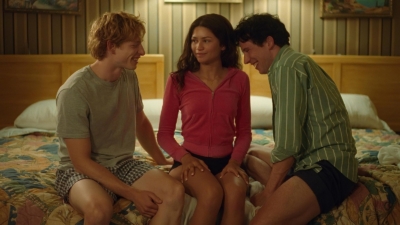
The film, written by Sakamoto Yūji (坂元裕二), tells one story from three different perspectives. First, we follow a single mother, Mugino Saori (麦野早織), who notices her son, Minato’s (湊), strange behaviour. Soon, she discovers that his form teacher, Hori Michitoshi (保利道敏), might be involved. Then, we follow the events from the teacher’s point of view. Towards the emotional finale, we switch perspectives once again, this time to see how it all unfolds for Minato himself.

In many regards, “Monster” is about innocent love which cannot exist because of strict social norms. The story is firmly set in Japanese reality, where everything must happen according to an established pattern. This reality is often openly criticised by the authors, for instance, in the scene where the school offers an insincere apology to the mother seeking justice. The scene is linguistically brilliant, by the way, because it perfectly exposes how stiffy and ridiculous the honorific register of Japanese can be.

This last suggestion seems to be pointed to by the returning theme of rebirth. First, it is signalled in the talks between Minato and his friend, Hoshikawa Yori (星川依里), and then it resounds in a moving and suspenseful finale. The last scenes of the film show the main characters reborn in a way: they can finally accept their identities and reject society’s limitations. This metaphorical rebirth also makes you hopeful for the world to become a better place, making the film’s message universal.

The cinematography by Kondō Ryūto (近藤龍人) is fascinating, especially as it is informed by the structure of the story. Taking the theme of perspective and points of view into consideration, the cinematographer often uses contrast as a visual device. We regularly visit the same places but look at them differently: sometimes the camera is placed in a different manner, and sometimes the place is filmed at a different time of the day. The final scene is particularly masterful in this regard. Typhoon and heavy rain are juxtaposed with sunny, beautiful weather there, perhaps symbolising the arrival of better days.

“Monster” is also very well-acted. Koreeda does an amazing job directing the two young actors: Kurokawa Sōya (黒川想矢) as Minato and Hiiragi Hinata (柊木陽太) as Yori. The boys delight with their nuanced portrayals, which are full of genuine emotions. And they also complement each other. Kurokawa’s Minato is distanced and reserved, while Hiiragi’s Yori is tremendously warm-hearted and open. Together, they form a uniquely harmonious duo.

Nagayama Eita’s performance (永山瑛太) as Hori Michitoshi is richly human. Hori is a well-meaning character, but somehow, he always worsens his situation. Nagayama finds humanity in this trait, highlighting both the character’s clumsiness and his pursuit of justice. The actor does extremely well in the scenes where Hori shows his vulnerable side, which in turn strengthens the audience’s sense of relatability to the character.
Last but not least, Tanaka Yūko (田中裕子) as the headmistress of Minato and Yori’s school is truly impressive. She’s a really popular actress in Japan, one who has received quite a few accolades for her craft. In Koreeda’s film, she once again demonstrates how talented a performer she is. She can combine two contradictions: be cold on the outside, yet let the audience know that inside she is struggling with overwhelming emotions. And she does so very subtly: with a delicate look here and a gesture there.
And so Koreeda does not fail this time either. His film is moving and yet it avoids being banal. It’s also quite thought-provoking, making the audience ponder about the power of perspective and the right to be happy. I believe these are the themes that will resonate with audiences all around the world, particularly in today’s landscape. It sure resonated with me and I consider it one of the best films I saw during this year’s Camerimage. Make sure to watch it if you can.








